Timed assessments can be daunting, but with the right strategies, you can approach them with confidence and clarity. This article offers practical tips and proven techniques to help you stay focused, manage your time effectively, and perform at your best when it matters most.
Introduction to Timed Assessments
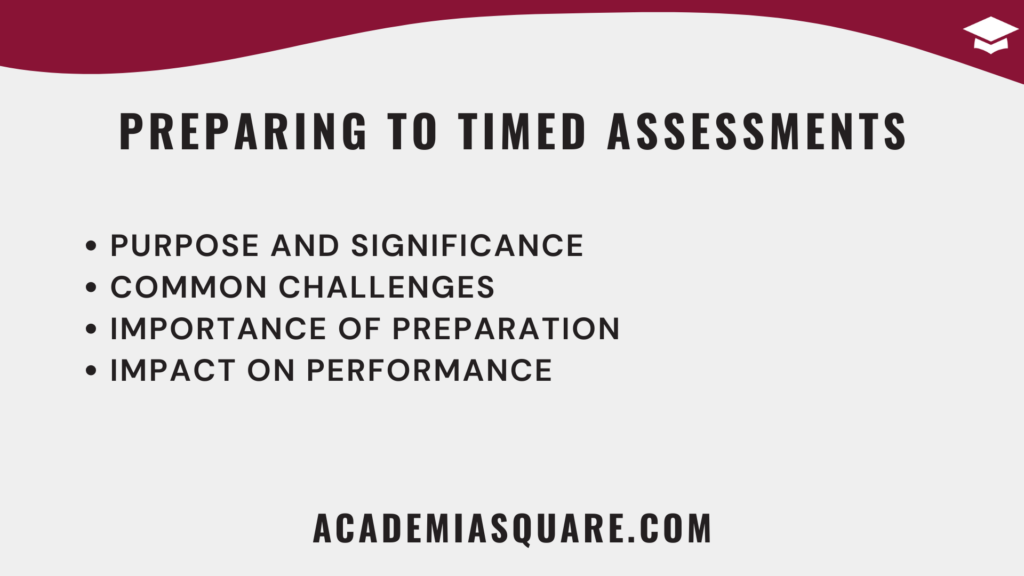
Timed assessments can often be overwhelming, especially if you’re not fully prepared. Understanding how to prepare for timed assessments is essential for achieving optimal performance. Whether you’re facing a standardized test, an online quiz, or an in-class exam, these assessments come with a unique set of challenges. The pressure of completing tasks within a limited time frame can cause anxiety and hinder your ability to think clearly. But with the right strategies, you can significantly improve your performance and build confidence.
The key to success in timed assessments lies not only in knowledge but also in effective time management, mental preparation, and practice. Properly preparing for these tests involves understanding the format of the assessment, knowing what to expect, and mastering techniques that allow you to perform at your best under pressure. By dedicating time to these strategies, you can make the most of your preparation and test-taking time.
Understanding the Pressure
The biggest challenge of timed assessments is the pressure to perform quickly. Many students feel overwhelmed by the ticking clock and struggle with staying focused. To successfully tackle this challenge, it’s important to remember that the test is designed to evaluate not just your knowledge but your ability to manage time effectively. By learning how to prepare for timed assessments in advance, you’ll be better equipped to handle the stress and perform with confidence.
Building a Strategy for Success
One of the most important aspects of preparing for a timed assessment is developing a clear strategy. This strategy should cover everything from how you manage your time during the test to how you prioritize tasks and deal with tricky questions. Below are some tips to help you create an effective plan:
- Start Early: Begin preparing well in advance of the test. Cramming the night before will only increase anxiety and reduce your performance.
- Simulate Exam Conditions: Take practice tests under timed conditions to get comfortable with the time constraints.
- Review Key Material: Focus on the areas that are most likely to be covered in the test, but don’t neglect to review all sections.
By breaking down your preparation into these manageable steps, you’ll improve your readiness for the timed assessment. Remember, how to prepare for timed assessments isn’t just about studying the material; it’s about practicing the skills you’ll need to manage your time effectively during the exam.
Understanding the Exam Format
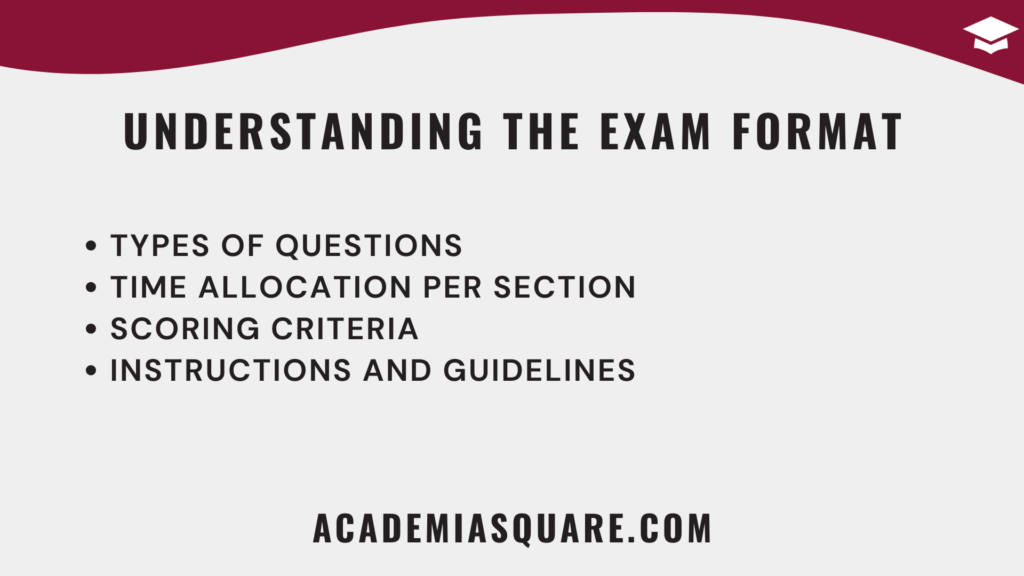
When it comes to preparing for timed assessments, one of the most crucial steps is understanding the format of the test. Knowing what to expect allows you to strategize and manage your time more effectively. Every assessment follows a specific structure—whether it’s multiple choice, short answer, essay-based, or problem-solving. The better you understand the format, the more prepared you’ll be to tackle each section efficiently. It’s also essential to tailor your preparation to the specific requirements of the test.
Why Exam Format Matters
Understanding the exam format helps you gauge how much time to allocate for each section, how to approach each question, and what kinds of materials you may need to bring. This allows you to prepare more strategically. For example, knowing that a portion of your exam will involve essay writing gives you time to practice quick yet comprehensive essay structures, whereas multiple-choice tests may require practice in speed and accuracy. Incorporating this knowledge into your study routine is a key part of how to prepare for timed assessments.
Steps to Understand and Prepare for the Format
To optimize your time during a timed assessment, take the time to research or ask for specifics about the test format. Most instructors or exam providers offer insights into the format before the test, so use that information to your advantage. Here are a few tips to guide you:
- Review Previous Exams: If you can, review past exams or sample questions. This will give you a sense of the format and difficulty level.
- Clarify Test Structure: Understand how many sections the test has, how long each section lasts, and how they are weighted.
- Practice Specific Question Types: Focus on the types of questions likely to appear, practicing them under timed conditions.
By practicing under these specific conditions, you’ll gain confidence in how to prepare for timed assessments. When the day of the test arrives, you’ll know exactly what to expect, and you’ll be able to manage your time accordingly, ensuring a smoother, less stressful experience.
Effective Time Management Strategies
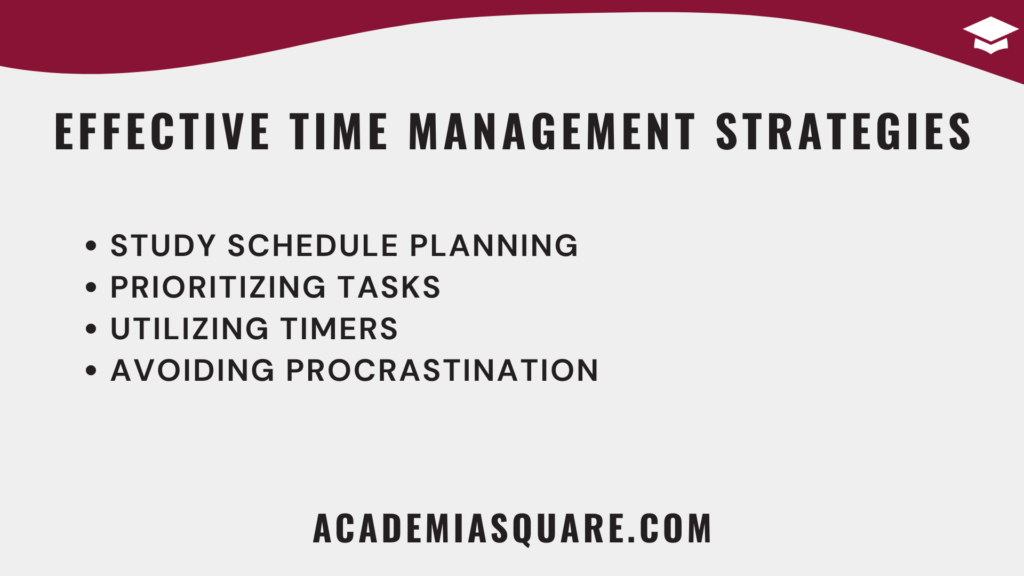
Mastering how to prepare for timed assessments goes hand in hand with mastering time management. One of the biggest challenges when taking a timed test is the ability to pace yourself and allocate time wisely across different sections. Without a clear time management strategy, you might end up spending too much time on one question and leaving others unanswered. This can be a recipe for stress and lower scores. Learning to pace yourself and handle time pressure is just as important as studying the material itself.
Why Time Management is Crucial
During any timed assessment, the clock is constantly ticking, and each second counts. This means that the pressure of managing your time effectively is a critical skill. It’s easy to get caught up in the details of difficult questions, but spending too much time on one question can make the rest of the exam feel rushed. The key is to ensure that you complete all sections within the time allotted, without sacrificing quality for speed. Time management will not only help you maximize your performance but also keep you calm during the test.
How to Create a Time Management Plan
The first step in effective time management is understanding how much time you have for each section of the exam. Break it down and establish how long you can afford to spend on each question type. Here’s how you can create a practical plan:
- Allocate Time Wisely: Divide your total exam time by the number of sections. Then assign each section a portion of that time based on its difficulty level and point value.
- Prioritize Quick Wins: Start with easier questions or sections where you know you’ll perform well. This will build confidence and leave you with more time for the challenging parts.
- Set Mini Deadlines: Have a mental timer for each section to ensure you’re staying on track throughout the exam.
With these strategies in place, you’ll be much more equipped to handle time constraints, ensuring that you stay focused and maintain control throughout the assessment. It’s not about rushing, but about being strategic with your time. Adjusting your approach to time management is a powerful tool in how to prepare for timed assessments.
Mental and Physical Preparation Before the Test
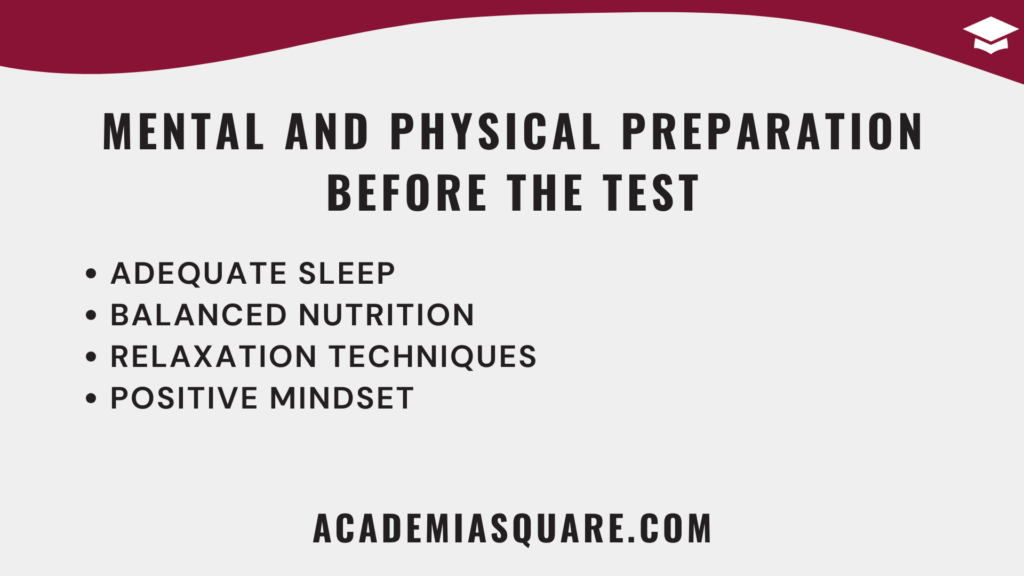
When it comes to how to prepare for timed assessments, mental and physical preparation plays a vital role in your success. It’s not just about studying hard; it’s about ensuring that your mind and body are in the best possible state to perform under pressure. Many students neglect these factors, focusing solely on academic knowledge, but the physical and mental readiness can have a significant impact on how you handle the stress of a timed exam.
The Importance of Mental Readiness
Your mindset going into the exam is just as crucial as how well you know the material. Being calm, focused, and confident will help you think more clearly and manage your time better. Mental preparation involves building a positive mindset and using relaxation techniques to calm pre-exam nerves. If you’re feeling anxious or stressed, it can be hard to concentrate, leading to mistakes or a slower pace. Start practicing stress-relief techniques such as deep breathing, meditation, or visualization to set yourself up for success on exam day.
Physical Preparation for Peak Performance
Just as mental preparation is essential, physical readiness is equally important. Adequate rest, nutrition, and hydration can significantly impact your test performance. A lack of sleep or poor nutrition can impair your cognitive functions, leading to slower decision-making, memory problems, and reduced focus. Here’s how to prepare physically:
- Get Enough Sleep: Aim for 7-8 hours of sleep the night before the exam. Sleep helps your brain consolidate information and improves focus.
- Eat a Healthy Meal: Consume a balanced meal rich in protein, whole grains, and fruits or vegetables to fuel your brain and sustain energy levels during the test.
- Stay Hydrated: Drink plenty of water. Dehydration can lead to fatigue and hinder your concentration.
Incorporating these mental and physical preparation strategies will give you a significant advantage during the exam. Preparing both your mind and body is a proven way to reduce anxiety and increase efficiency, ensuring you perform at your best under timed conditions.
Building Test-Taking Confidence
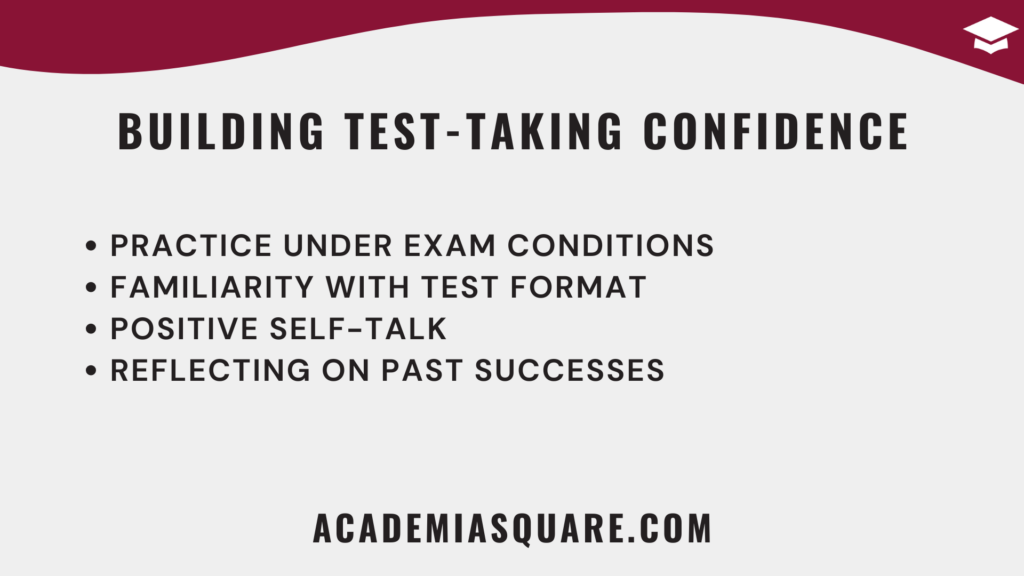
Confidence is a key factor in how to prepare for timed assessments, as it allows you to approach the test with a calm, focused mindset. Many students struggle with self-doubt, which can hinder their ability to perform well under pressure. Building test-taking confidence isn’t just about knowing the material—it’s about trusting yourself, managing stress, and remaining composed throughout the assessment. Confidence boosts mental clarity and ensures you can handle challenges more effectively during the test.
Strategies for Building Confidence
To build confidence, you need to develop a mindset that promotes self-belief and resilience. Here are some techniques to help you build the mental strength necessary for timed assessments:
- Visualize Success: Imagine yourself taking the test successfully—this mental imagery can help reduce anxiety and boost confidence.
- Practice, Practice, Practice: Regular practice under timed conditions will give you a sense of familiarity with the exam format, making the actual test feel less intimidating.
- Positive Self-Talk: Reframe negative thoughts. Instead of thinking, “I’m going to fail,” replace it with, “I’ve prepared well, and I can do this.”
Dealing with Unexpected Challenges
Despite your preparation, there may still be moments of uncertainty or challenging questions during the exam. In these situations, confidence is key. Stay calm and trust in your abilities. Don’t let one difficult question derail your entire test. If you encounter something unexpected, take a deep breath, move on, and come back to it later if time permits. Your ability to maintain composure is crucial for successful test-taking.
Confidence doesn’t come overnight, but by incorporating these strategies into your preparation, you’ll develop the mindset needed to thrive during timed assessments. Whether it’s visualizing success or practicing under pressure, every step you take contributes to building a strong sense of self-assurance.
How to Use Practice Tests for Timed Preparation
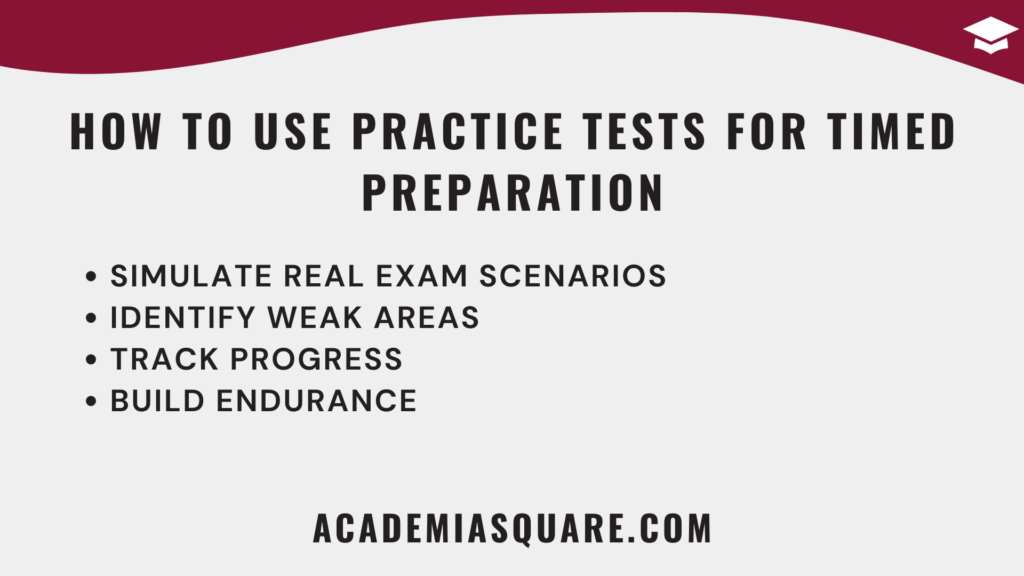
One of the most effective ways to prepare for timed assessments is through consistent practice. Simulating the test environment with practice tests helps you familiarize yourself with the format, improve your pacing, and reduce anxiety on the actual test day. When practicing under timed conditions, you’re training both your knowledge and your ability to think quickly, which is crucial for performing well when every minute counts.
The Benefits of Practice Tests
Practice tests provide an invaluable opportunity to identify your strengths and weaknesses. By regularly completing them under timed conditions, you can pinpoint areas where you need more focus, while also becoming more efficient at answering questions. Furthermore, taking practice tests helps reduce the fear of the unknown, giving you a clearer idea of what to expect and how to handle the time pressure. This type of preparation is a critical part of how to prepare for timed assessments.
Creating a Practice Test Routine
To fully benefit from practice tests, create a structured routine that mimics actual exam conditions. Here’s how:
- Set a Timer: Always time yourself while practicing. Make sure you stick to the time limits that the real exam will impose.
- Review After Each Test: Take time to review your answers and understand where you went wrong. This helps improve your accuracy and pacing for the next test.
- Increase Difficulty Gradually: As you become more comfortable with the format, increase the difficulty of your practice tests to challenge yourself further.
Practice tests aren’t just about repetition—they’re about improving your approach to the test itself. By incorporating them into your preparation plan, you’ll feel more in control when it’s time for the actual timed assessment.
Strategies for Managing Exam Anxiety
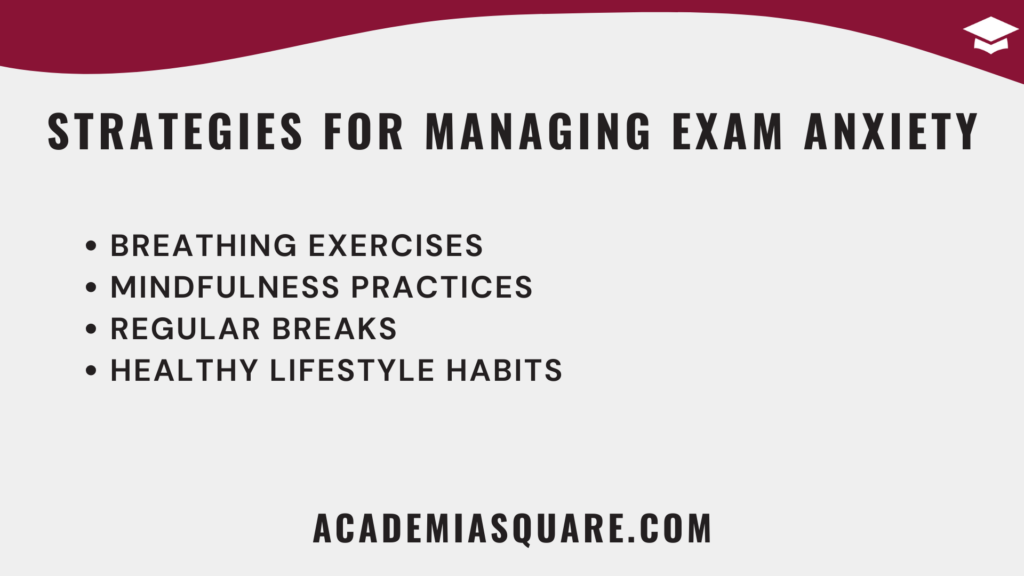
Managing anxiety is a key component of how to prepare for timed assessments. Exam anxiety can hinder performance by causing mental blocks, slowing down your thinking process, and preventing you from recalling important information. In high-pressure situations, anxiety can make it harder to focus, leading to mistakes or inefficient use of time. However, with the right strategies, you can keep anxiety at bay and improve your performance during timed assessments.
Understanding the Root of Exam Anxiety
Exam anxiety often stems from fear of failure, perfectionism, or the pressure to perform well. Understanding the underlying causes of your anxiety can help you address it more effectively. By acknowledging the anxiety and preparing for it, you can shift your mindset from fear to focus. Recognizing that you’ve prepared for the assessment will also ease much of that tension. Effective mental preparation is a key aspect of how to prepare for timed assessments.
Practical Techniques to Combat Anxiety
There are several proven techniques to reduce anxiety before and during the exam:
- Deep Breathing: Slow, deep breaths can help calm your nervous system and reduce physical symptoms of anxiety.
- Mindfulness Meditation: Practicing mindfulness helps you stay present and focused, reducing the impact of racing thoughts.
- Positive Affirmations: Remind yourself of your preparation and ability to handle the test. This can shift your mindset from fear to confidence.
Implementing these strategies will help you control anxiety during your timed assessments. Staying calm and focused during the test ensures that you use your time effectively and perform at your best. Taking care of your mental health is just as important as academic preparation when it comes to acing exams.
Using Active Recall and Spaced Repetition for Timed Assessments
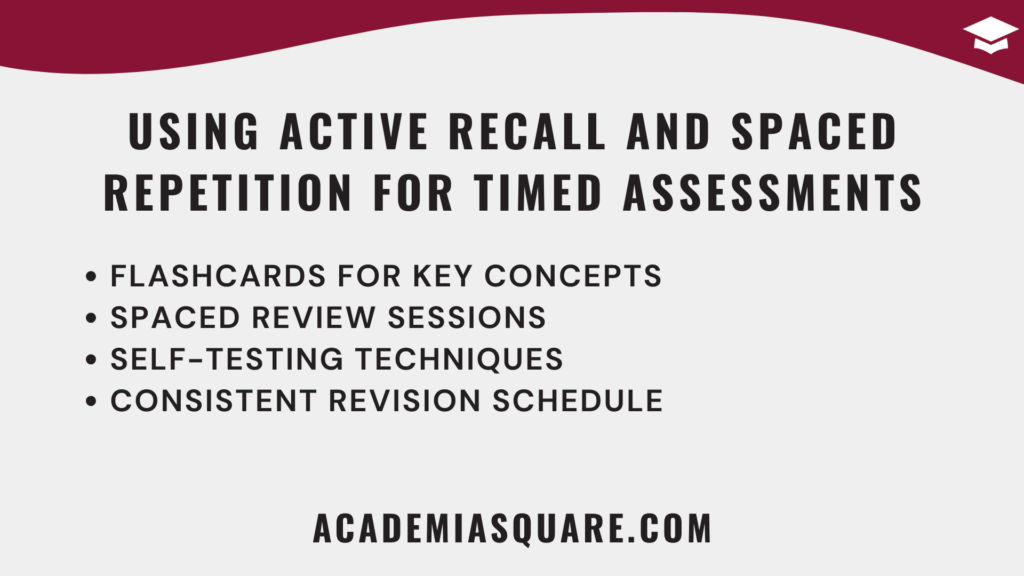
When it comes to how to prepare for timed assessments, incorporating active recall and spaced repetition into your study routine can greatly improve retention and performance. These techniques are backed by cognitive science and are highly effective in reinforcing memory and understanding. By utilizing them, you can ensure that you not only remember the material but can also apply it effectively under time pressure during the test.
What is Active Recall?
Active recall is a learning technique that involves actively engaging with the material you are trying to learn, rather than passively reading or highlighting. This method requires you to retrieve information from memory, which strengthens your ability to recall that information when you need it most—during your timed assessment. Studies show that active recall improves long-term retention far more than passive review methods.
What is Spaced Repetition?
Spaced repetition is the practice of reviewing material at increasing intervals, which helps combat forgetting and improves long-term retention. Instead of cramming all at once, you review information periodically, ensuring that your brain reinforces the material over time. Together with active recall, spaced repetition ensures that you’re continuously strengthening your memory, which is vital for performing under pressure during timed assessments.
How to Implement These Techniques
Here’s how you can use these techniques effectively for timed assessments:
- Active Recall Practice: Use flashcards or quizzes to test yourself on the material, rather than just reading or re-writing your notes.
- Spaced Repetition Tools: Use apps or systems like Anki or SuperMemo to review information at spaced intervals leading up to the exam.
- Integrate Both Methods: Combine active recall with spaced repetition by periodically testing yourself on information at increasing intervals.
These methods not only help you retain information but also train you to recall it quickly and efficiently—exactly what you need to excel in a timed test scenario. Incorporating both active recall and spaced repetition into your study plan will enhance your preparation and increase your chances of success in any timed assessment.
Improving Speed and Accuracy Under Time Pressure
In how to prepare for timed assessments, one of the biggest challenges is balancing speed with accuracy. It’s common to feel rushed, and in that rush, students often make careless mistakes. To perform well under time pressure, you need to find the sweet spot where you can work quickly without sacrificing the quality of your answers. This requires practice and a strategic approach to both speed and accuracy.
Why Speed and Accuracy Matter
In timed assessments, there is limited time to answer all the questions, and accuracy is just as important as how quickly you can provide the right answers. If you rush and make mistakes, your performance suffers. However, if you work too slowly, you might leave questions unanswered, also affecting your score. The key is finding a balance between speed and accuracy—knowing when to move quickly and when to slow down and ensure your answer is correct.
Techniques for Improving Speed and Accuracy
Here are a few practical techniques to help you enhance both speed and accuracy:
- Practice Timed Problem Solving: Regularly solve problems under time constraints to simulate exam conditions. This helps you build both speed and confidence.
- Eliminate Unnecessary Steps: Streamline your process by focusing on essential information and eliminating unnecessary details that may slow you down.
- Work in Blocks: Break the test into smaller, manageable sections. Completing a section at a time helps maintain focus and prevent feeling overwhelmed.
Improving both speed and accuracy is a gradual process. The more you practice under timed conditions, the better you’ll become at finding the right balance. This preparation allows you to remain efficient and precise, even when time is running out during a timed assessment.
How to Tackle Different Types of Questions
One of the most important aspects of how to prepare for timed assessments is learning how to approach different types of questions effectively. Understanding the nature of the questions and how to manage them within the given time frame can significantly impact your performance. Whether you’re dealing with multiple-choice questions, essays, or problem-solving questions, each type requires a specific strategy to maximize your score and minimize the risk of making mistakes under pressure.
Multiple-Choice Questions
Multiple-choice questions (MCQs) are common in timed assessments, and they often require quick decision-making. To tackle these effectively, start by reading the question thoroughly and eliminating any clearly incorrect answers. If you’re unsure, try to use logic or previous knowledge to narrow down the choices. Don’t spend too long on any one question; if you’re stuck, move on and return to it later if time allows. Being strategic with MCQs can save valuable time.
Essay and Long-Answer Questions
For essay-type or long-answer questions, managing your time is key. Begin by quickly outlining your main points before starting to write. This ensures you have a clear structure, and it prevents you from going off-topic. Focus on answering the question directly and concisely. Don’t get bogged down in unnecessary details—stick to the most relevant points that clearly support your argument or response. Remember to leave a few minutes at the end to review and edit your answer if possible.
Problem-Solving Questions
Problem-solving questions, particularly in subjects like math or science, can be time-consuming but manageable with the right approach. Start by reading through the problem carefully and identifying the key information. Break the problem into smaller steps, and solve it methodically. Don’t rush—taking a moment to understand the problem thoroughly can help you avoid errors and save time in the long run. If you get stuck, skip ahead and come back to it later with a fresh perspective.
By understanding how to approach different types of questions, you can tackle your timed assessments more effectively. Practicing these strategies ahead of time will help you manage your time efficiently and improve both your speed and accuracy when answering questions during the exam.
The Role of Breaks and Rest During Exam Preparation
When considering how to prepare for timed assessments, many students overlook the importance of rest. Preparing for exams isn’t just about continuous studying—it’s about ensuring your mind remains sharp, focused, and ready to tackle challenges. Overloading yourself with information without breaks can lead to burnout, reduced productivity, and lower retention. Proper rest and strategically timed breaks not only help you stay refreshed but also significantly improve your performance during your timed assessments.
The Science Behind Breaks and Rest
Research shows that the brain works best when it alternates between periods of intense focus and recovery. After a certain period of study, fatigue sets in, which can decrease your ability to retain information and solve problems efficiently. Short breaks allow your brain to consolidate information and return to studying with a fresh perspective. Incorporating these breaks into your study routine is crucial to maintain peak cognitive performance as the exam day approaches.
Effective Break Strategies
Here’s how you can implement effective breaks into your study routine:
- The Pomodoro Technique: Study for 25 minutes, then take a 5-minute break. After four sessions, take a longer 15-30 minute break to recharge.
- Physical Activity: Take a walk, stretch, or do some light exercise during your breaks to increase blood flow and refresh your mind.
- Mindfulness Breaks: Practice deep breathing or meditation to reduce stress and improve focus when you return to studying.
It’s essential to strike a balance between focused study time and well-timed breaks. The right amount of rest will improve your mental clarity, help you stay focused longer, and ensure you’re fully prepared when it’s time to take the test. Remember, studying smarter—not harder—will give you the best results for your timed assessments.
Maintaining Focus and Avoiding Distractions
During preparation for timed assessments, maintaining focus is crucial to ensure you use your time effectively. Distractions, whether external or internal, can derail your concentration and reduce the quality of your study sessions. Developing strategies to minimize distractions will help you stay on task, boost productivity, and improve your chances of success in the exam.
Identifying Common Distractions
Understanding what typically distracts you during study sessions is the first step in managing these interruptions. Common distractions include:
- Social Media: Checking your phone or social media accounts can quickly eat up valuable study time.
- Environmental Factors: Noisy surroundings, interruptions from people, or a cluttered workspace can make focusing difficult.
- Internal Distractions: Wandering thoughts, hunger, or fatigue can cause a lack of concentration.
Strategies to Stay Focused
To avoid distractions and stay focused during study sessions, try implementing the following techniques:
- Use Focused Work Intervals: Similar to the Pomodoro Technique, use short bursts of intense focus, followed by a break.
- Create a Distraction-Free Zone: Designate a quiet, organized study space where distractions are minimized.
- Limit Technology Use: Keep your phone and computer apps off or use productivity apps to block social media during study time.
Staying focused and avoiding distractions is essential in how to prepare for timed assessments. With consistent practice and the right strategies, you can ensure that your preparation time is used wisely, allowing you to perform at your best on the day of the exam.
Exam Day Tips: Final Steps for Success
On the day of your timed assessment, how you manage your time and mindset is crucial for success. Even if you’ve prepared extensively, the way you approach the exam itself can make a huge difference. Knowing how to stay calm, organize your time, and ensure you’re fully prepared for the test is the key to optimizing your performance.
Prepare the Night Before
The day before the exam, avoid last-minute cramming. Instead, focus on reviewing key concepts and ensuring all logistical aspects are in place. Prepare your materials, such as pens, ID, and any allowed resources, the night before so that you won’t feel rushed on the day of the exam.
Arrive Early and Calm
Arriving at the exam location early will help you avoid any unnecessary stress. Use this time to relax and mentally prepare. Avoid looking at any study materials right before the exam starts. Instead, take a few moments to calm your nerves and focus on the task ahead.
Stay Mindful of Your Time During the Exam
As you start the exam, quickly scan the entire paper or test to get a sense of the question types and how to allocate your time. Prioritize the questions you’re most confident about to build momentum. Stick to the time limits you’ve set for each section and be prepared to move on if you get stuck on a particular question.
By following these final tips, you can walk into the exam feeling confident, organized, and ready to perform your best. The right preparation on exam day will ensure that everything you’ve practiced pays off when it counts most.
FAQs – How to Prepare for Timed Assessments
How can I manage time effectively during timed exams?
Use time-blocking strategies, allocate minutes per section, and practice pacing with mock exams. Research shows students improve speed by up to 30% with regular timed practice.
What is the best way to prepare mentally for a timed test?
Engage in visualization, affirmations, and mindfulness. Studies from Harvard Medical School show mindfulness reduces stress and improves cognitive function during tests.
Why are practice tests important for exam success?
Practice tests mimic real conditions, improve recall, and build exam endurance. Research from the Journal of Experimental Psychology confirms they boost performance significantly.
How do I overcome exam anxiety during timed assessments?
Use breathing techniques, prepare early, and focus on effort over outcomes. The American Psychological Association supports cognitive restructuring to reduce anxiety levels.
What are the benefits of active recall and spaced repetition for exams?
Active recall strengthens memory retention, and spaced repetition combats forgetting. Research by Dr. Ebbinghaus supports spaced learning to enhance long-term recall.
How much sleep should I get before a timed test?
Aim for 7–9 hours of sleep. According to NIH studies, well-rested students show higher cognitive performance and reduced anxiety during high-pressure assessments.
What should I eat before a timed exam for better focus?
Consume protein-rich foods and complex carbs. A study published in Nutritional Neuroscience highlights how balanced meals enhance attention and mental stamina.
How can I improve accuracy under time pressure?
Break questions into parts, eliminate wrong answers, and stay calm. Training under realistic time conditions enhances both speed and precision, according to educational psychology research.
Which study strategies work best for timed assessments?
Combine active recall, spaced repetition, and mixed practice. Studies from cognitive science confirm these methods outperform passive reading or highlighting.
How should I handle difficult questions during a timed test?
Skip and return later, mark key ideas, and don’t dwell. Efficient test-takers maximize points by focusing on easier questions first—an approach backed by time-use studies.
Sources and Recommended Reading on Preparing for Timed Assessments
- Cohen, David. “Winning Strategies for Test Taking, Grades 3–8.” SAGE Publications. (Practical guide offering test-taking strategies for students)
- Shain, Deborah D. “Study Skills and Test-Taking Strategies for Medical Students.” Springer. (Techniques for effective studying and test-taking)
- “Test-Taking Strategies Can Be the Key to Improving Test Scores.” NASSP Bulletin, SAGE Journals. (Insights into effective test-taking strategies)
- Hasper, Anna. “Student Confidence: 5 Simple Tips for Exam Preparation.” Cambridge University Press. (Tips to boost student confidence during exams)
- “Achieve: Preparing for Your Assessment Revision.” Oxford University Press. (Strategies for effective revision)
- “Test-Taking Strategies.” Elsevier Student Life. (Advice on preparing for tests effectively)
- Nolan, Michael F. “A Method to Assist Students with Effective Study Habits and Test-Taking Strategies.” Medical Science Educator. (Methodologies to improve study habits and test-taking)
- Academia Square – Time Blocking Productivity Technique for Academics: How to Guide
- Academia Square – How to Deal with Exam Anxiety


